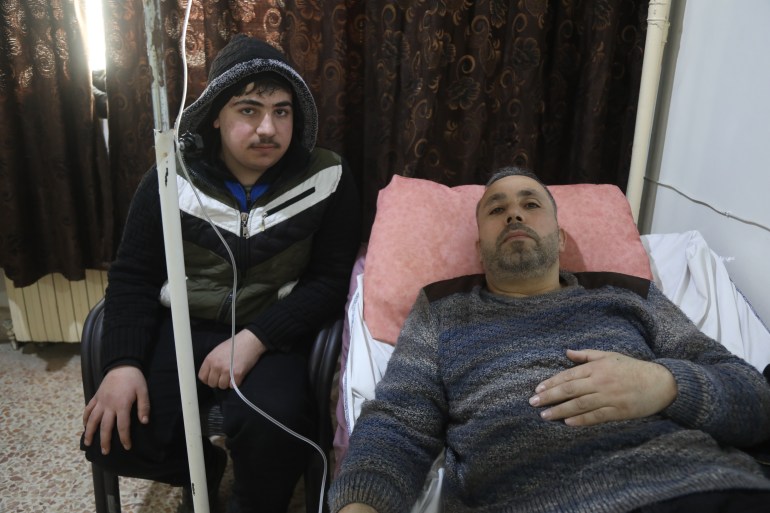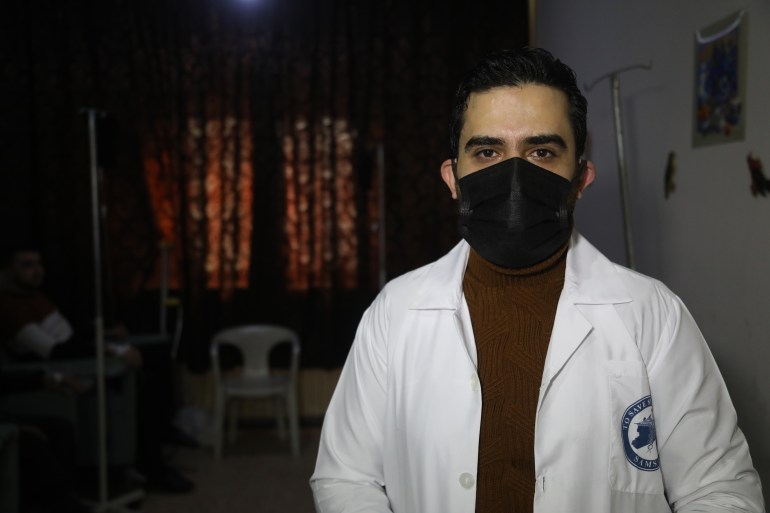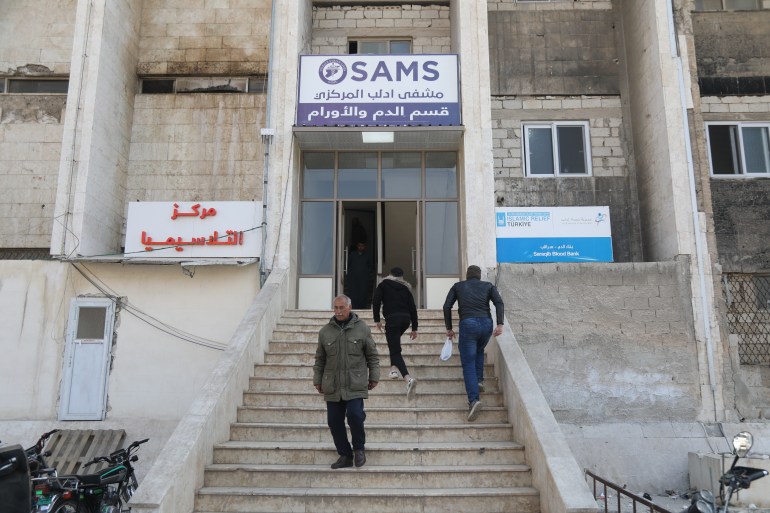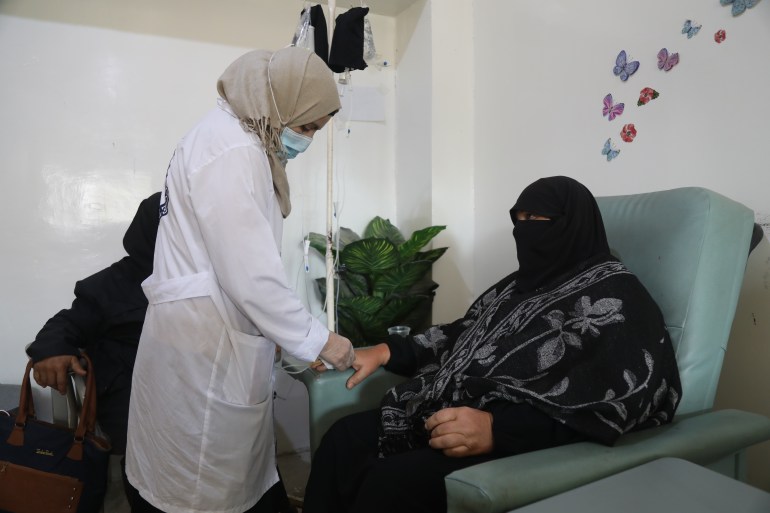Closed borders put cancer patients in Idlib at risk | Turkey-Syria Earthquake
Idlib, northwest Syria – Lying on his hospital bed in a room full of other patients, Mustafa Eid looks from the intravenous solution entering his body, seemingly counting the drops, to the people around him, each with a needle in their arm delivering the medicines hanging next to them.
Eid, from Ariha south of Idlib, is at the Haematology and Oncology Centre in Idlib, receiving his seventh dose of an advanced cancer treatment he is undergoing.
His first six doses were in Turkey, but after the massive earthquakes that hit southern Turkey and northern Syria on February 6, he says: “I heard that cancer patients were being stopped from entering Turkey to receive treatment there… I felt as if my death was near.”

Treatment in Turkey had been free, but this one dose cost the father of seven about $350, and it is worrying him a great deal.
“Today, I took the first dose that some friends and relatives bought for me, but I do not know what I will do after that because my treatment is long and very expensive,” Eid told Al Jazeera.
The Haematology and Oncology Centre in Idlib Central Hospital, supported by the Syrian American Medical Society, is the only centre in Idlib providing free treatment for cancer patients.
The centre is overworked; it turns nobody away and struggles to treat them in spite of an acute shortage of chemotherapy drugs, some of which are entirely unavailable in the centre’s pharmacy, and a lack of radiotherapy facilities. For some drugs that it does not have, the Centre has to ask patients to procure them externally so they can administer them.

The burden on the centre has increased since Turkish authorities closed the borders after the earthquake, leaving some of these patients on the Syrian side with nowhere else to turn.
“Before the earthquake, our centre received about 2,000 patients a month, and about 500 doses were administered a month. But after the earthquake, more than 50 patients returned from Turkey and received doses in our centre,” said Dr Ayham Jamo, head of haematology and oncology at Idlib Central Hospital.
The shortage of medicine and the sometimes exorbitant cost required to secure it elsewhere have become an obsession with many patients whose treatment schedules are essential for their recovery.
Hasna al-Obeid, 52 years old, from Sheikh Bahr town in rural Idlib, came to the centre to complete her breast cancer treatment, which she had started in Antakya, Turkey. When the earthquake destroyed the hospital where she was being treated, she headed back to Syria to see what her options were there.

“I am afraid that the treatment I am receiving here will be stopped before I complete the treatment schedule because I don’t have enough money to buy it at my expense,” al-Obeid said.
“When I returned from Turkey, I did not come on a medical exit permit as I was supposed to [because the hospital that would normally issue it was destroyed], and I handed over my ID at the crossing border. I worry that I won’t be able to return to Turkey if patients are allowed to complete their treatment there.”
“Delay in taking the doses on the specified days leads to a deterioration in the patient’s health condition and could lead to the patient’s death,” Dr Jamo said.
Due to the poor medical capabilities in the region, the Medical Coordination Office at Bab al-Hawa crossing is working to obtain approval from the Turkish side, which would allow patients to receive free treatment in Turkish hospitals.

Most of the treatment required is for newborns, heart diseases, and cancer patients, in addition to emergency cases.
According to Bab al-Hawa crossing, during the past year, approximately 1,264 patients were transferred to receive treatment in Turkish hospitals, while the number of cancer patients last January reached 149.
“Those most affected by the decision of closing the crossing are cancer patients who need emergency intervention for their treatment, especially since the time factor is very important for their treatment,” said Dr Bashir Ismail, director of the medical documentation office at Bab al-Hawa crossing.
Sources in the Turkish interior ministry told Al Jazeera that transfers were being allowed for emergency cases.
“Following the necessary measures taken after the earthquake, and transition to the normalisation of daily life in Turkey [earthquake affected areas], there hasn’t been any prohibition or restriction on emergency patient transfers/crossings from Idlib to Turkey,” the sources said
But Turkish authorities have yet to announce the date for reopening the borders for all patients to receive treatment in Turkish hospitals, prolonging patients’ anxiety.

Pingback: click to find out more
Pingback: prostitutes near me
Pingback: cams
Pingback: ออกแบบลายเซ็นฟรี
Pingback: สล็อต เครดิตฟรี
Pingback: BAU in Diyala
Pingback: afrikaanse oorbellen